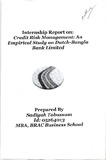| dc.contributor.advisor | Ahmed, Dr. Mojib U. | |
| dc.contributor.author | Tabassum, Sadiyah | |
| dc.date.accessioned | 2017-05-16T06:39:21Z | |
| dc.date.available | 2017-05-16T06:39:21Z | |
| dc.date.copyright | 2008 | |
| dc.date.issued | 2008-04-29 | |
| dc.identifier.other | ID 05264013 | |
| dc.identifier.uri | http://hdl.handle.net/10361/8140 | |
| dc.description | This internship report is submitted in a partial fulfillment of the requirements for the degree of Master of Business Administration, 2008. | en_US |
| dc.description | Cataloged from PDF version of internship report. | |
| dc.description | Includes bibliographical references (page 82). | |
| dc.description.abstract | This research report is an individual assignment as a part of the internship programme under the MBA curriculum in the BRAC University. The primary objective of the report is to study the general account and credit risk management (CRM) practices at DBBL with particular reference to the Bank's Mirpur Branch and recommend measures for further improvement. But the quantitative analysis part of this report is not up to the requirement of research design due to non-availability of relevant data from the Bank. The banking sector in Bangladesh is plagued with myriads of problems. Among these, the loan default problem is the most severe one. Over the last decade many structural, prudential, regulatory and legal measures were initiated by the government to curb the loan default problem. Yet all these measures could not produce any significant outcome in dealing with the problem, especially in case of government banks and financial institutions. The private banks, though, have shown considerable improvement in the credit management system which is evident from their low level of classified loans. Dutch-Bangla Bank Limited (DBBL) is one such private bank having a strong and efficient credit management system supported by robust CRM strategies. This research report is an empirical study on the CRM practices at DBBL. This report involves a descriptive research based on empirical review of secondary data. The target populations for the study were: (t) the general accounts of DBBL Mirpur Branch and (z) past credit related financial data of DBBL. The past five years' credit related data were also taken as sample for the study. A subjective judgemental analysis was conducted on the credit information of selected sample borrowers, and the selected quantitative credit related data were put to a judgemental interpretation by the researcher. So far little empirical study was conducted on the CRM practices in the banks of Bangladesh as systematic management of credit risk in the business of lending is almost a new concept in our banking sector. Yet some literature on the related subjects are available which discuss credit risk mitigating measures in general. | en_US |
| dc.description.statementofresponsibility | Sadiyah Tabassum | |
| dc.format.extent | 93 pages | |
| dc.language.iso | en | en_US |
| dc.publisher | BRAC University | en_US |
| dc.rights | BRAC University Internship reports are protected by copyright. They may be viewed from this source for any purpose, but reproduction or distribution in any format is prohibited without written permission. | |
| dc.subject | Dutch-Bangla Bank Limited | en_US |
| dc.subject | Credit risk management | en_US |
| dc.title | Credit risk management: an empirical study on Dutch-Bangla Bank Limited | en_US |
| dc.type | Internship report | en_US |
| dc.contributor.department | BRAC Business School, BRAC University | |
| dc.description.degree | M. Business Administration | |

